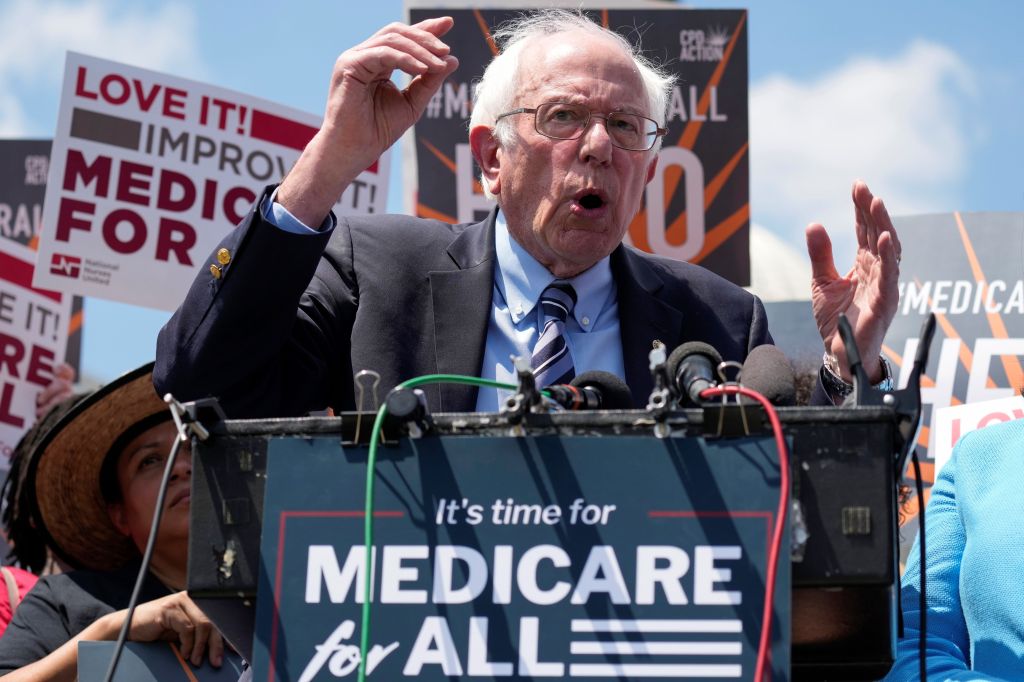Sen. Bernie Sanders (I-Vt.) speaks about Medicare for All during a May press conference at the Washington State Capitol. (AP Photo/Carolyn Custer)
The entire progressive rationale for “Medicare for All” is based on a lie. Or rather, two lies.
They argue that Americans are dissatisfied with the current state of their health insurance, and a single-payer system would alleviate that dissatisfaction.
But recent polls show neither claim is true. Americans are generally satisfied with their existing health insurance system. And single payer would clearly exacerbate, rather than solve, the problems Americans currently face.
Sen. Bernie Sanders (R-Vt.) aptly sums up progressive views. He recently described the current health system as “completely broken, dysfunctional and cruel.”
So he will no doubt be surprised by the results of a new national survey commissioned by my organization, the Pacific Institute. The survey found that 90% of Americans are “very” or “somewhat” satisfied with their current health insurance plan. This is an increase of 4 points from last year’s poll. When asked to rate the coverage, three-quarters of respondents said it was “good” or “very good.”
Sanders also argued that his Medicare for All law is “legislation that ordinary Americans want” and that it will “make life much easier for Americans.” But in reality, only 16% of respondents said they “definitely” support switching to single payer.
Among the small number of respondents who are dissatisfied with their current insurance, the number one complaint is limited access to medical specialists. The second most common complaint was that access to family doctors was limited.
Such dissatisfaction will likely increase rapidly after taking power. Look at the dysfunction of single-payer systems in Canada and the United Kingdom.
Mr. Sanders and other progressives have long praised Canada’s health care system, but private health insurance for what the government deems medically necessary is illegal. However, almost half of Canadians do not have reliable access to a family doctor, compared to less than a third of Americans. Approximately 70% of Americans are confident that they will be able to get emergency care in an emergency. Only 37% of Canadians said the same. Overall, twice as many Americans as Canadians report having “comfortable” access to health care.
Meanwhile, fewer than three in 10 people in the UK say they are satisfied with the government-run National Health Service, which has been in place for 75 years. Britons cited long waiting times (7.6 million people were on care waiting lists in England as of June) and severe staffing shortages as the main reasons for their dissatisfaction. Their concerns are well-founded, given that the ongoing doctors’ strike has resulted in nearly 1 million appointments being canceled or postponed.
Wait times for treatment are at record highs in Canada. Last year, the median wait time between being referred by a general practitioner and being treated by a specialist was more than 27 weeks. To clear the backlog, officials in some states are turning to private, for-profit clinics that operate outside the traditional public funding system.
Some Canadians have begun traveling to the United States for emergency surgeries. In fact, British Columbia health officials sent hundreds of cancer patients across the border to Washington state for treatment earlier this summer.
Private healthcare providers and insurance companies have recently seen a significant increase in popularity in the UK among people on waiting lists for specialist treatment.
America’s health insurance system isn’t perfect. But as the saying goes, the grass isn’t always greener north of the border or across the Atlantic Ocean. A complete government takeover of the U.S. health care system, as in Medicare for All, would significantly worsen the lives of American patients.
Sally C. Pipes is president and CEO of the Pacific Research Institute and the Thomas W. Smith Fellow in Health Policy. Her most recent book is False Premises, False Promises: The Disastrous Reality of Medicare for All (Encounter 2020). Follow her on Twitter @sallypipes.
